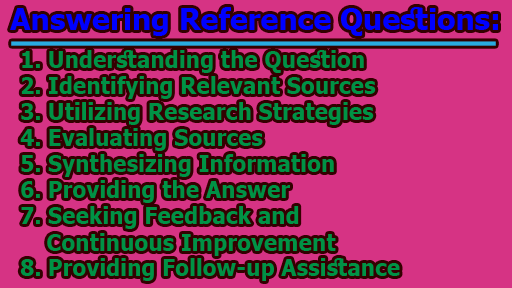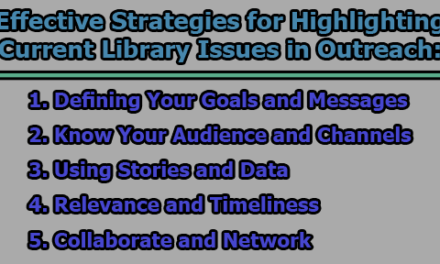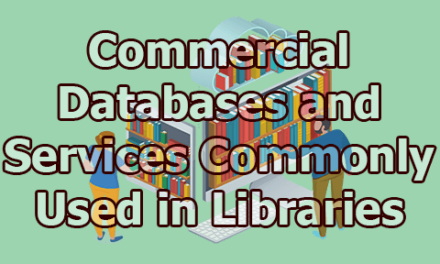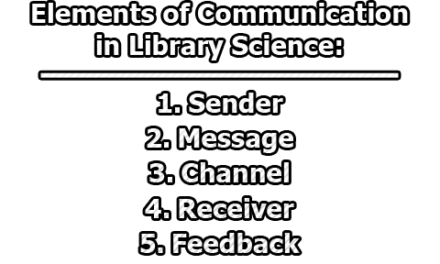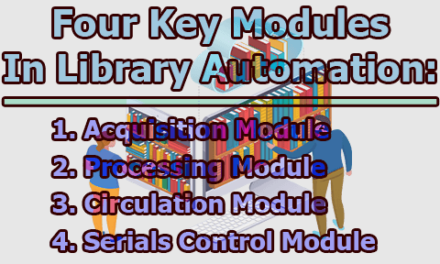Answering Reference Questions:
Reference questions are an essential part of information-seeking behavior, whether in libraries, educational institutions, or online platforms. These questions can range from simple inquiries about specific facts to complex research queries that require extensive investigation. Answering reference questions effectively requires a combination of information literacy skills, critical thinking, and access to diverse sources. This article aims to provide an overview of the process involved in answering reference questions and equip individuals with the necessary tools and strategies to deliver accurate and reliable information.
1. Understanding the Question: The first step in answering reference questions is to thoroughly comprehend the query. This involves carefully reading and analyzing the question to identify the key information, context, and scope. It is important to clarify any ambiguous terms or concepts and gather additional context from the questioner if necessary. By gaining a clear understanding of the question, you can proceed to the next stage with a solid foundation.
2. Identifying Relevant Sources: Once the question is understood, it is crucial to identify the most appropriate sources to consult. This step depends on the nature of the question and the available resources. Common sources for reference questions include books, scholarly articles, databases, websites, and experts in the field. The ability to navigate various sources effectively plays a vital role in obtaining accurate and reliable information.
3. Utilizing Research Strategies: The research strategies employed to answer reference questions can significantly impact the quality and efficiency of the response. This section outlines several effective research strategies, including:
a) Keyword Searching: Utilizing appropriate keywords and Boolean operators (AND, OR, NOT) to construct effective search queries in databases and search engines.
b) Subject Headings: Exploring subject headings or controlled vocabularies in library catalogs and databases to refine searches and retrieve relevant materials.
c) Citation Chaining: Tracing the references cited in scholarly articles and books to discover additional sources that may contribute to answering the question.
d) Cross-referencing: Checking indexes, bibliographies, footnotes, and related sources to identify supplementary materials or alternative perspectives.
e) Expert Consultation: Contacting subject matter experts, librarians, or professionals in the field to seek guidance or access specialized knowledge.
4. Evaluating Sources: Once a range of sources has been gathered, it is critical to evaluate their credibility, relevance, and accuracy. This step ensures that the information obtained is trustworthy and suitable for the reference question at hand. Factors to consider when evaluating sources include author expertise, publication date, peer-review process, objectivity, and reputation of the publishing entity. Critical evaluation skills are essential in distinguishing reliable information from misinformation or biased content.
5. Synthesizing Information: After gathering and evaluating the relevant information, the next step is to synthesize the findings. This involves organizing and summarizing the key points, concepts, and arguments from the various sources. The synthesized information should be presented in a logical and coherent manner that addresses the question while maintaining accuracy and clarity.
6. Providing the Answer: Once the information has been synthesized, it is time to provide the answer to the reference question. The answer should be clear, concise, and tailored to the needs and background of the questioner. It is important to cite the sources consulted and provide any necessary explanations or context to ensure a comprehensive response. If additional information is required, it should be communicated along with suggestions for further research or exploration.
7. Communicating Effectively: In answering reference questions, effective communication is key to ensuring that the information is understood and appreciated by the questioner. This involves using clear and concise language, avoiding jargon or technical terms unless necessary, and adapting the response to the intended audience. Providing visual aids, such as charts or diagrams, can enhance comprehension and facilitate understanding.
8. Documenting and Reflecting: Keeping a record of the reference questions answered, the sources consulted, and the strategies employed is crucial for future reference and professional development. Reflecting on the process can help identify areas for improvement, refine research skills, and enhance the ability to answer similar questions in the future. This step contributes to a continuous learning process and ensures growth as an information professional.
9. Keeping Up with Current Information: In order to provide accurate and up-to-date information, it is crucial for information professionals to stay informed about the latest developments in their respective fields. This involves regularly reading scholarly journals, attending conferences or webinars, and subscribing to relevant newsletters or mailing lists. By staying updated, information professionals can deliver the most current and reliable information to users.
10. Tailoring the Response to the User’s Information Needs: Understanding the user’s information needs and background is essential for providing a relevant and satisfactory response. It is important to consider factors such as the user’s level of expertise, the purpose of the inquiry, and any specific requirements or constraints they may have. By tailoring the response to the user’s specific needs, the information professional can ensure a more personalized and effective service.
11. Adhering to Ethical Guidelines and Copyright Laws: Information professionals have a responsibility to respect and uphold ethical guidelines and copyright laws when answering reference questions. This involves properly citing and attributing sources, obtaining necessary permissions for copyrighted materials, and adhering to any applicable intellectual property laws. Respecting ethical standards ensures integrity in the information provided and promotes ethical practices within the profession.
12. Promoting Information Literacy Skills: Answering reference questions presents an opportunity to promote information literacy skills among users. Information professionals can provide guidance on how to effectively search for information, critically evaluate sources, and utilize various information resources. By empowering users with these skills, they become better equipped to conduct their own research and make informed decisions.
13. Handling Difficult or Sensitive Questions: Reference questions may occasionally involve sensitive or controversial topics. In such cases, information professionals must approach the questions with sensitivity and empathy. They should strive to provide objective and unbiased information while being mindful of the potential impact of their response. It may be necessary to provide additional context, alternate viewpoints, or resources for further exploration.
14. Collaborating with Colleagues and Experts: Collaboration and consultation with colleagues and subject matter experts can greatly enhance the quality of the response to a reference question. Information professionals can tap into the collective knowledge and expertise of their peers to gather insights and recommendations. Collaborative efforts can lead to a more comprehensive and well-rounded answer, particularly when dealing with complex or specialized inquiries.
15. Seeking Feedback and Continuous Improvement: Feedback from users is invaluable in evaluating and improving reference services. Encouraging users to provide feedback on the accuracy, usefulness, and clarity of the response helps identify areas for improvement. Information professionals should also seek feedback from colleagues and supervisors to enhance their skills and address any gaps in knowledge or performance.
16. Adapting to Technological Advancements: Technological advancements play a significant role in the way reference questions are answered today. Information professionals should stay abreast of emerging technologies and leverage them to enhance their services. This may include utilizing artificial intelligence, chatbots, or online databases to facilitate faster and more efficient information retrieval.
17. Providing Follow-up Assistance: In some cases, a reference question may require ongoing assistance or follow-up. Information professionals should be prepared to offer further guidance, clarification, or additional resources to support the user’s information needs. Following up with users also demonstrates a commitment to providing a comprehensive and satisfactory service.
In conclusion, answering reference questions is a complex task that requires a combination of knowledge, skills, and strategies. By following a systematic approach, embracing technological advancements, promoting ethical practices, and fostering information literacy, information professionals can provide accurate, reliable, and user-centered information services that empower individuals and contribute to their intellectual growth and development.
FAQs:
What are reference questions?
Reference questions are inquiries posed by individuals seeking specific information or assistance in locating relevant resources. These questions can range from simple factual queries to complex research topics.
Where do reference questions come from?
Reference questions can come from various sources such as library patrons, students, researchers, or individuals accessing online platforms or databases. They can be received in person, via email, over the phone, or through online chat services.
How do I effectively understand a reference question?
To understand a reference question effectively, it is important to carefully read and analyze the question, clarify any ambiguous terms, and gather additional context if necessary. It is also helpful to actively listen and engage with the questioner to ensure a clear understanding of their information needs.
What sources can I use to answer reference questions?
The sources you can use to answer reference questions depend on the nature of the question and the available resources. Common sources include books, scholarly articles, databases, websites, and subject matter experts. The choice of sources should be based on their relevance, credibility, and suitability for the question at hand.
How do I evaluate the credibility of sources when answering reference questions?
Evaluating the credibility of sources involves considering factors such as author expertise, publication date, peer-review process, objectivity, and reputation of the publishing entity. Critical evaluation skills are essential in distinguishing reliable information from misinformation or biased content.
What strategies can I use to search for information when answering reference questions?
Effective research strategies for answering reference questions include keyword searching, subject heading exploration, citation chaining, cross-referencing, and expert consultation. These strategies help in locating relevant information and expanding the scope of the search.
How should I communicate the answer to a reference question?
When communicating the answer, it is important to use clear and concise language, avoiding jargon unless necessary. The response should be tailored to the user’s needs and background, and it is beneficial to provide citations for the sources consulted. Visual aids or supplementary materials can also enhance understanding.
How can I promote information literacy skills while answering reference questions?
Promoting information literacy skills involves providing guidance on effective search strategies, critical evaluation of sources, and utilization of different information resources. By empowering users with these skills, they become better equipped to conduct their own research and make informed decisions.
How can I handle difficult or sensitive reference questions?
Difficult or sensitive reference questions require sensitivity, empathy, and an objective approach. It may be necessary to provide additional context, present alternate viewpoints, or offer resources for further exploration. Handling such questions with care and professionalism is essential.
How can I improve my skills in answering reference questions?
Continuous improvement can be achieved by seeking feedback from users and colleagues, reflecting on past experiences, and staying updated with the latest developments in your field. Professional development opportunities, such as attending conferences or webinars, can also enhance your skills and knowledge.
References:
- American Library Association. (2016). Reference and information services: An introduction (4th ed.). American Library Association.
- Booth, A., & Brice, A. (2004). Evidence-based practice for information professionals: A handbook. Facet Publishing.
- Cassell, K. A., & Hiremath, U. (2013). Reference and information services in the 21st century: An introduction (3rd ed.). Neal-Schuman Publishers.
- Radford, M. L. (2017). Reference interviewing and the reference interview: A practical guide for librarians (3rd ed.). Libraries Unlimited.
- Reitz, J. M. (2014). Online dictionary for library and information science. Libraries Unlimited.
- Rubin, R. E. (2010). Foundations of library and information science (3rd ed.). Neal-Schuman Publishers.
- Schmidt, K. (2017). Reference renaissance: Current and future trends. Chandos Publishing.
- Smith, L. C. (2015). The reference librarian’s handbook: A guide to understanding, acquiring and serving the needs of users. Rowman & Littlefield.
- Taylor, A. G., & Joudrey, D. N. (2009). The organization of information (3rd ed.). Libraries Unlimited.
- Whitlatch, J. B., & Sannwald, W. W. (2009). Reference and information services for the adult learner: Challenging issues for the traditional and technological era. Libraries Unlimited.

Library Lecturer at Nurul Amin Degree College

